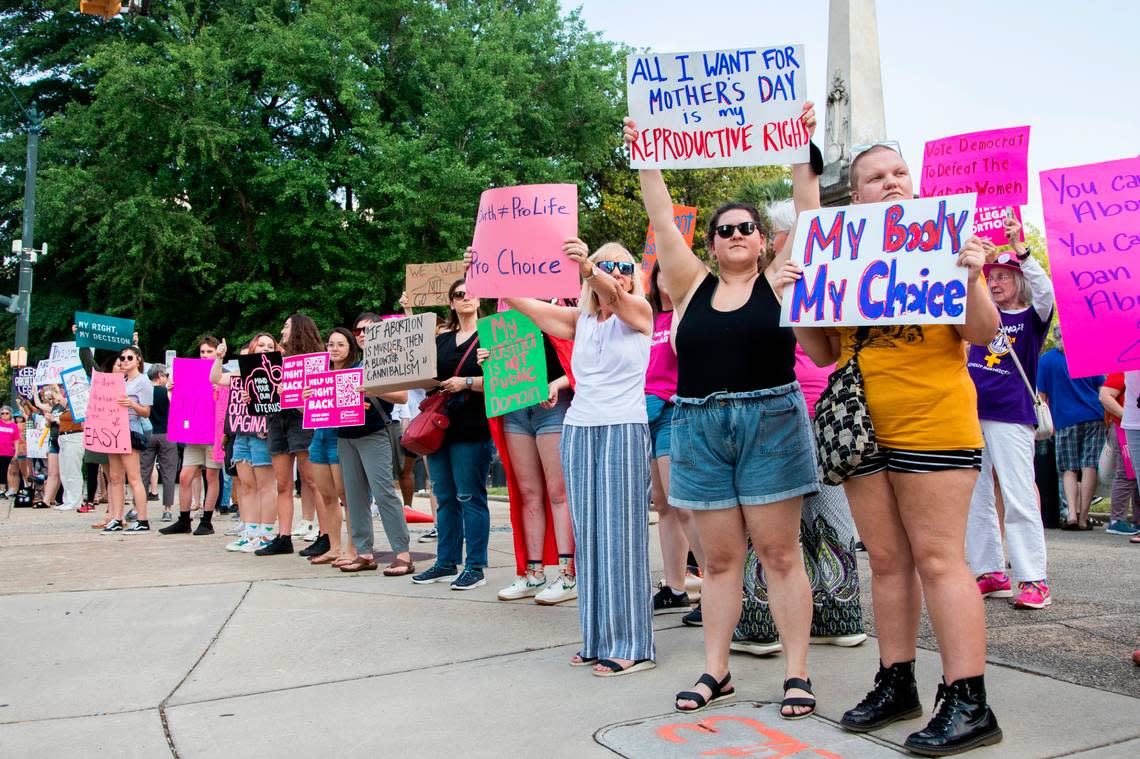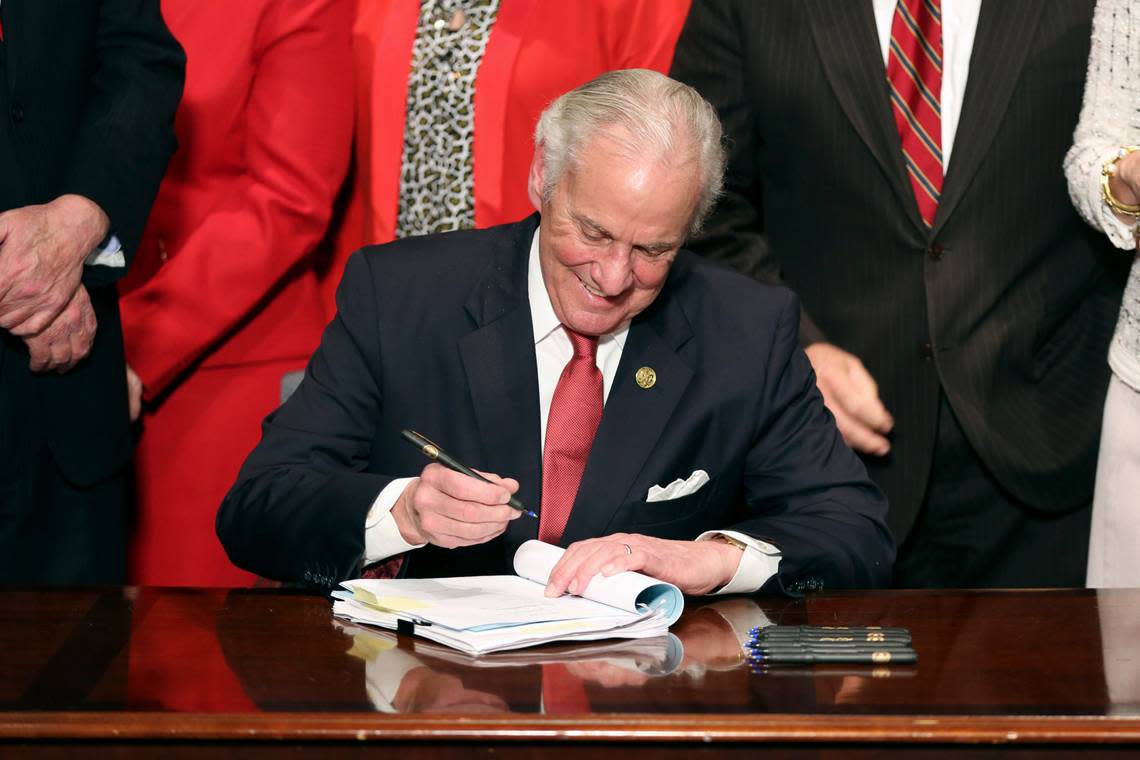SC Supreme Court hears challenge to 6-week ‘fetal heartbeat’ abortion law
The S.C. Supreme Court heard arguments Wednesday from abortion providers and the state regarding their legal dispute over South Carolina’s six-week abortion ban, which has been blocked since mid-August pending the state high court’s decision in the case.
The hearing, which lasted more than two hours and included frequent interjections by the five justices, pitted Planned Parenthood South Atlantic and Greenville Women’s Clinic — South Carolina’s lone abortion providers — against state officials.
At issue, primarily, is whether the six-week ban, known as the “fetal heartbeat” law because it prohibits abortion after the detection of fetal cardiac activity, which occurs by approximately six weeks of pregnancy, violates the South Carolina Constitution.
Lawyers for the abortion providers argued the law violates the state’s constitutional right to privacy, which they said extends to a pregnant woman’s right to have an abortion.
The state defendants argued the right to privacy has nothing to do with protecting abortion rights, but rather was enshrined in the state Constitution in 1971 to constrain government surveillance.
The word “abortion” does not appear in the state Constitution and was not considered by the West Committee, a study committee formed in 1966 to study and overhaul the state Constitution, or by the voters who in 1970 approved a ballot initiative to adopt a constitutional right against “unreasonable invasions of privacy,” the state’s lawyers argued.
“If the argument is what did they mean based on what the West Committee said, what the General Assembly said, what the ballot question said and what the voters thought it said, this is a hands down winner,” said Kevin Hall, an attorney for House and Senate leadership. “Because it cannot be reasonably suggested that the term ‘privacy’ in Article 1, Section 10 had anything to do with abortion. Nobody believes that.”
The plaintiffs countered that if the court were to find the right to privacy extended only to searches and seizures and invasions of privacy through modern electronic devices, as the defense argued, it would overturn numerous past cases where a broader right to privacy had been envisioned.
“The limitation … that the state has suggested,” Planned Parenthood attorney Julie Murray said, “would make a hash of this court’s existing case law.”
It also, she said, would make South Carolina’s privacy provision powerless against laws criminalizing birth control or requiring sterilization.
Murray said the highest courts in six other states with express privacy provisions in their constitutions had found the provisions extended to bodily integrity and pregnancy decisions.
“Certainly that’s not binding on this court,” Murray said of the other rulings. “But I do think in terms of thinking about how to interpret what people would have understood privacy to mean in the late ‘60s, early ‘70s, when many of these states adopted their provisions, it’s certainly relevant that other state courts have looked at very similar language and come to the conclusion that it covers the right of a woman to decide whether to bear a child.”
When Justice Kaye Hearn — the only woman on the court — asked Hall what, under the state’s limited conception of privacy rights, would prevent the General Assembly from enacting restrictions on contraception, he cited substantive due process.
Substantive due process, which refers to fundamental rights deeply rooted in U.S. history and tradition, could also be used to justify past court decisions, such as Singleton v. State, a 1993 case in which the court ruled a death row inmate could not be forcibly medicated in order to make him “competent” for execution, Hall said.
“This court doesn’t have to overrule Singleton or any of those other cases in order to decide this one,” he said.
All five justices were active participants throughout Wednesday’s proceedings, asking numerous questions and offering their two cents about each sides’ arguments.
It was difficult to glean which direction any of the justices were leaning, as they lobbed considerable criticism at the arguments offered by both sides and frequently pointed out what they thought the parties should be saying but were not.
Murray said afterward it was clear the stakes in the case extend well beyond the right to an abortion.
“What is at issue in this case is women’s right to determine what to do with their own bodies and how the course of their lives will go,” she said. “I think I was struck this morning by how little comfort came from the state as to why if it can ban abortion, why it cannot also ban birth control, why it cannot control women’s lives in other ways with respect to whether they have children.”
South Carolina Attorney General Alan Wilson, who sat in court Wednesday, said afterward he thought the state had made strong arguments and was glad discourse had remained civil in spite of the controversial issue under discussion.
“I feel like we stuck to the rule of law and the plenary authority of the General Assembly and the governor, the executive branch, to pass and sign legislation into law,” Wilson said. “And so I feel guardedly optimistic that hopefully our arguments will carry the day.”
‘Our decision will not be based on politics,’ chief justice says
The six-week ban, which makes exceptions in certain cases of rape and incest, fatal fetal anomalies and threats to the life and “permanent impairment” of the mother, has been the subject of litigation since its passage in February 2021.
It was stayed in federal court pending the U.S. Supreme Court’s Dobbs decision, went into effect after Dobbs from June 27 to Aug. 17 and has since been suspended pending review of the lawsuit brought by Planned Parenthood South Atlantic, Greenville Women’s Clinic and two physicians. The suit argues the ban violates the state Constitution’s rights to privacy, equal protection and due process.
Wednesday’s hearing comes one day after the state Senate voted to uphold its own version of a slightly narrower version of the existing six-week ban rather than agree to a near-total abortion ban passed by the House.
The Senate’s decision triggers a negotiation phase with the House, although it’s unclear if the two sides will meet, much less come to an agreement on a more restrictive abortion ban in wake of the Dobbs decision, which overturned the constitutional right to an abortion.
South Carolina’s Republican Legislature appeared poised earlier this year to pass a more restrictive abortion ban in the aftermath of Dobbs, but the House and Senate have thus far been unable to reach a compromise.
The existing six-week ban has been temporarily blocked since Aug. 17, when the state Supreme Court opted unanimously to suspend it as the litigation proceeded.
The state’s justices said in their opinion suspending the law that although the U.S. Supreme Court had ruled in Dobbs that there was no right to privacy in the federal Constitution, it was an “arguably close question” whether South Carolina’s own Constitution afforded some right to privacy that may affect state abortion laws.
As a result of the six-week law’s suspension, the state’s prior 20-week ban, passed in 2016, remains in effect.
There is no deadline by which the state Supreme Court must decide the case heard Wednesday.
While the process has been expedited to this point, the justices are expected to be deliberate in their decision making.
Chief Justice Donald Beatty joked that while the court often takes quite some time to resolve such weighty cases, he wouldn’t keep the parties waiting for years, as has happened at least once in the past.
“Our decision will not be based on politics, it will not be based on cultural differences,” Beatty said at the conclusion of Wednesday’s hearing. “It will be based purely on what we believe the law says and requires in this instance.”


